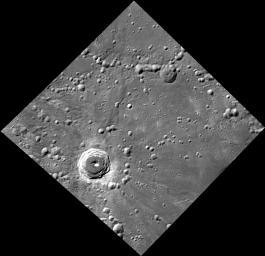This image, taken with the Wide Angle Camera (WAC), shows an unnamed complex crater in Mercury's northern hemisphere. The crisp morphology of the terraced walls and central peak, and the high-reflectance ejecta blanket and rays surrounding the crater, indicate that the crater is relatively young. Also visible are many secondary craters, possibly resulting from the impact that formed this crater to the west.
This image was acquired as part of MDIS's high-resolution stereo base map. The stereo base map is used in combination with the surface morphology base map to create high-resolution stereo views of Mercury's surface, with an average resolution of 250 meters/pixel (0.16 miles/pixel or 820 feet/pixel) or better. During MESSENGER's one-year mission, the surface morphology base map is acquired during the first 176 days, and the second 176 days are used to acquire the complementary stereo base map, which includes the image here.
Date acquired: January 04, 2012
Image Mission Elapsed Time (MET): 234155258
Image ID: 1222319
Instrument: Wide Angle Camera (WAC) of the Mercury Dual Imaging System (MDIS)
WAC filter: 7 (748 nanometers)
Center Latitude: 51.54°
Center Longitude: 95.26° E
Resolution: 176 meters/pixel
Scale: The complex crater is 33 km (20 miles) in diameter
Incidence Angle: 61.6°
Emission Angle: 15.6°
Phase Angle: 48.5°
The MESSENGER spacecraft is the first ever to orbit the planet Mercury, and the spacecraft's seven scientific instruments and radio science investigation are unraveling the history and evolution of the Solar System's innermost planet. Visit the Why Mercury? section of this website to learn more about the key science questions that the MESSENGER mission is addressing. During the one-year primary mission, MDIS is scheduled to acquire more than 75,000 images in support of MESSENGER's science goals.
These images are from MESSENGER, a NASA Discovery mission to conduct the first orbital study of the innermost planet, Mercury. For information regarding the use of images, see the MESSENGER image use policy.

 Planetary Data System
Planetary Data System












